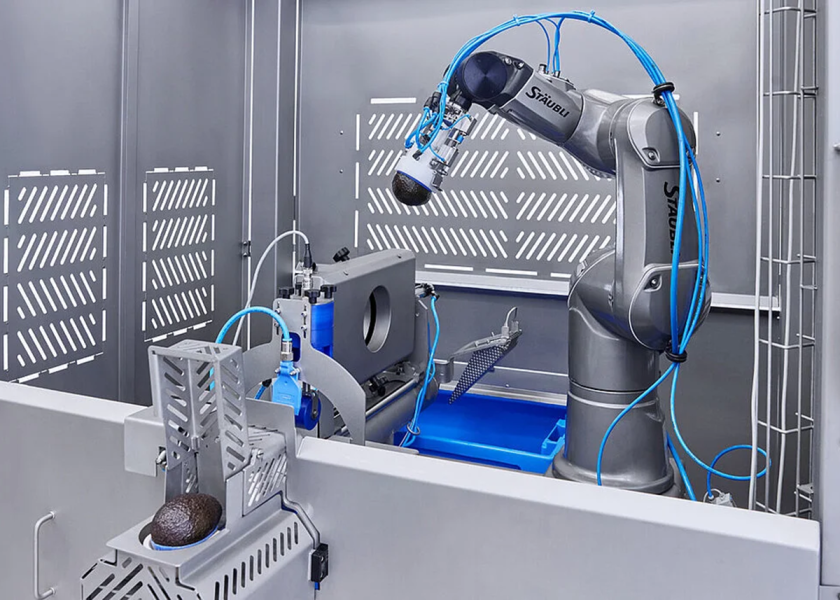Company showcases automated machine for prepping avocados

Kronen GmbH has developed an automated, robot-based solution for cutting, pitting and peeling avocados.
The Germany-based producer and supplier of stand-alone machines, special-purpose machines and high-tech processing facilities for the fresh-cut industry says the robotic line can be used to peel, halve and pit avocados gently and efficiently, according to a news release. If needed, the system can also be adapted to process different types of fruit that are suitable for robotic processing in the middle segment.
“In the case of avocados, which are very sensitive, you may initially think that a machine-based solution is not possible. Here at Kronen, however, we have decades of experience in food processing, even with sensitive products, and we invest a great deal in research and development to advance our customers with innovative solutions,” Stephan Zillgith, managing director, said in a news release. “In this case, manual processing is not ergonomic and cannot achieve better results. The quality and yield achieved by the robotic solution are just as high, if not better, which is why we chose to develop this brand new solution.”
The avocados are placed in an inlay tray by an employee, according to Kronen, and the robot then performs the individual processing steps in a fully automated procedure:
- The robot removes the avocado with a grabber specially adapted to the fruit and uses a rotating movement on a pitting unit to remove the pit from the first half.
- The knives cut the flesh in half and clamp the pit.
- The avocado is then peeled, then the robot removes the peel from the flesh by moving it over the peeling knife.
Another employee checks the product for skin and stone debris and natural damage as it leaves the system. The good product can be collected in crates or discharged via a belt depending on the capacity and customer requirements.
Depending on the capacity required, several robots can be used simultaneously; three robots, for example, are able to process up to 1,000 avocados per hour, the release said. A variety of additions can be used to further extend the line, such as the GS 10-2 belt cutting machine to subsequently cut the peeled, halved avocados into slices.
Kronen says the automated system was developed In cooperation with the food processing industry and robotics supplier Stäubli. The system features integrated Stäubli robots with specially treated surfaces for optimal cleaning, the release said. It has its own separate safety housing and is equipped with remote maintenance technology, meaning that customers can make the most of quick and direct support from a Kronen service employee if required.
To be suitable for automatic processing, the avocados must have a degree of ripeness that corresponds with a pressure value of 0.2 N/mm2 to 0.8N/mm2 (hardness measured with a penetrometer), according to the release.
Automation maximizes hygiene, which is a fundamental requirement in the food industry and in terms of consumer safety and product shelf lives, the release said. It also becomes increasingly important within the context of a skilled labor shortage.
Kronen says another reason for developing a machine-based solution is the fact that manual processing requires a constant turning movement, which puts a great deal of strain on employees’ wrists.
The new system was demonstrated live at the Anuga FoodTec trade show held in March in Cologne, Germany, the release said.







